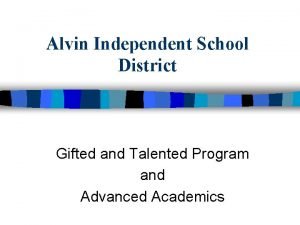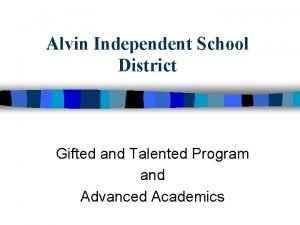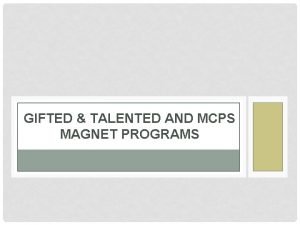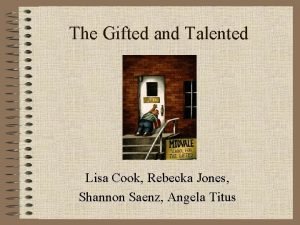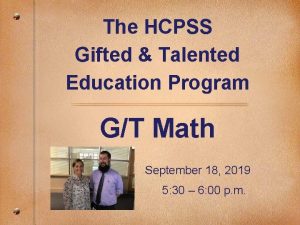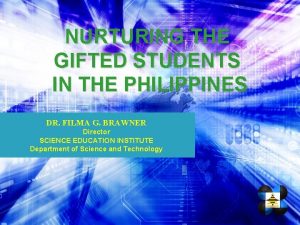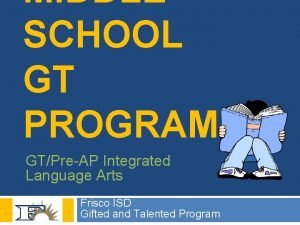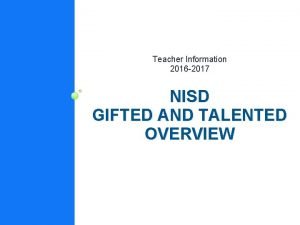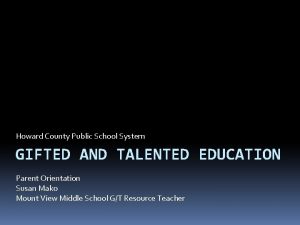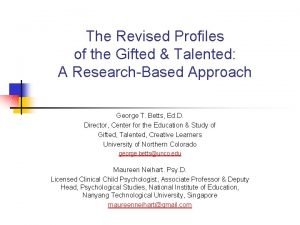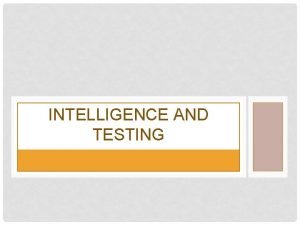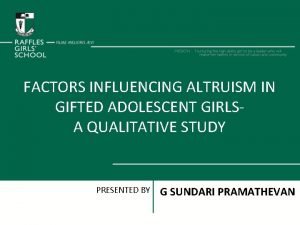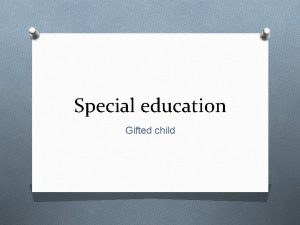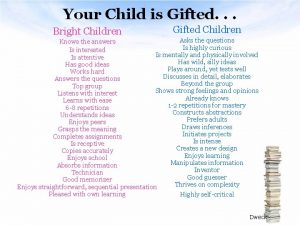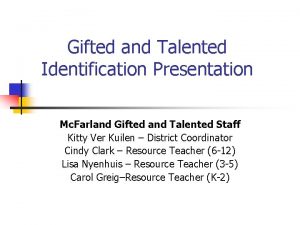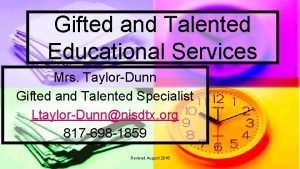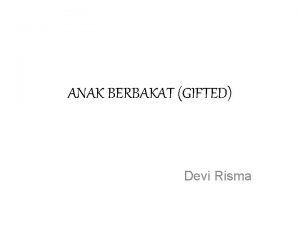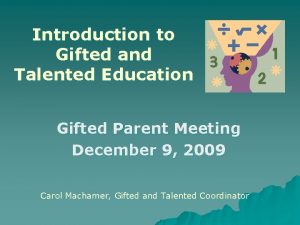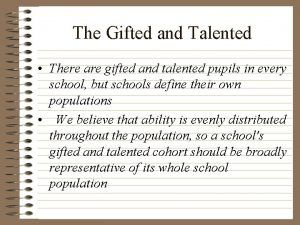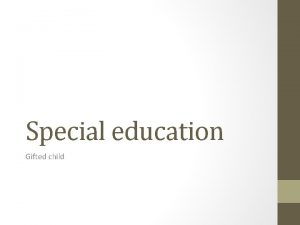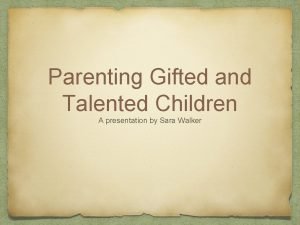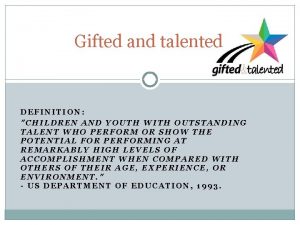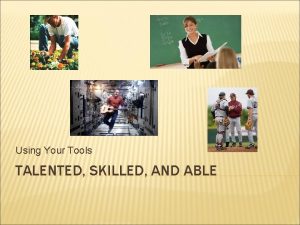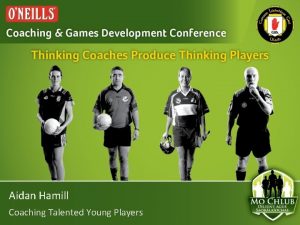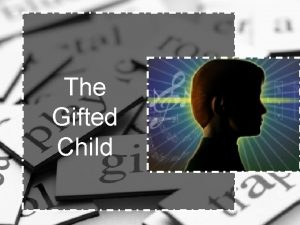Gifted talented child Gifted refers to children with














- Slides: 14

Gifted / talented child Gifted refers to children with high potential VS. Talented means they display skills which are advanced when compared to other children of their age

What makes a child gifted and talented? Giftedness is due to a combination of factors including what the child inherits genetically, the development of the child before birth, and the nurturing of the child. It is generally accepted that a gifted child would have the potential to perform at a level that is significantly beyond that of the majority of other children of the same age, in one or more skill areas such as language, problem solving, physical or interpersonal skills. A gifted child may have the potential to become, for example, a great artist, thinker or athlete. A gifted and talented child not only has this potential, but is developing the skills to perform at this advanced level.

Intelligence and skills A child may be gifted and talented in one of these areas, or in many areas. Logical and mathematical (eg. number, classification and problem solving ability) • Verbal/language (eg. reading, writing and speaking ability) • Visual and performing arts (eg. drawing, painting, musical ability) • Body/movement/psychomotor ability (eg. dance, athletic ability)Interpersonal (eg. communication, leadership ability) • Intrapersonal (eg. reflective, self sufficient ability)

Multiple intellingences Theory proposed by Howard Gardner in the early 1980 s. He believed that the way intelligence was measured before the 1980 s often left some extremely talented and gifted children behind. For example, a student could be musically gifted and play perfect violin solos in second grade, but be unable to memorize their multiplication tables. Your gifted students could excel in one or more of the following intelligences: • • kinesthetic interpersonal verbal logical naturalistic intra-personal visual musical

Hidden Gifted Special attention should be given to the 'hidden gifted'. These include: – disadvantaged gifted – disabled gifted – those with learning difficulties – underachieving gifted – those from minority cultural and ethnic groups


Recommendations for teachers • Select a broad topic or many connected topics where students can compile their own research. • Suggest creative ways that the students can present the information. • Create a rubric to assess the project. • Make a project sheet that has deadlines, check points, and descriptions of tasks. • Designate defined roles for each member of the group so that everybody contributes.

Activities suggested A. Connecting to Themes in Literature When teachers select a theme, they can center the whole semester or even. This gives continuity to the school year and allows students to make educational connections. Themes can connect to literature themes, such as the following: • a great journey • good versus evil • growing up • family relationships • connection to supernatural

B. Write a newspaper article Students become reporters about the topic. The teacher can create an "event. " The students can create a newspaper article or even an entire newspaper. Make a topic research Students make a research on the issue established by the trachet on the Internet. Than, they create documentaries about theme. They could interview experts, recreate evidence in their research, show pictures from their research, etc.

D. Literary Techniques and Free Verse Objective: Teaching metaphor, simile, alliteration, onomatopoeia, and other literary techniques can be enhanced by poetry written in free verse. This not only allows the student freedom from traditional rhyme and meter, it also challenges them to look outside the proverbial box. Begin this language arts project with the following items. A handout of literary techniques. Photographs or art work to use as prompts for writing. An alternate prompt might be a list of characters from literature to describe or situations in current events.

E. Internet Exploratory Activities • You can show students how to search online, how to choose which sites are of the highest quality, and how to find sites that actually address the issues that they would like to research. Then, let them do additional research about a topic that interests them. E. g. if the topic is the Ancient Rome, some students might like to do Internet research on what people wore in Ancient Rome, while others might like to read about what a kid's life was like in Ancient Rome. Some may even be curious about the weapons used in Ancient Roman warfare. Let them explore the topic that most interests them and encourage them to give a short written or oral presentation to share what they have learned with the rest of the class.

Lessons Specifically for Advanced Learners Lessons to capture advanced learners' imaginations, inspiring them to step out of their comfort zones to investigate, research, create, develop and produce assignments that are evidence of their best work are imperative. Here are some engaging lessons for the advanced learner. • Shakespeare for Gifted Students • Unsolved Mysteries Lesson Plans for Gifted Students • Language Arts Projects for Gifted Students • Tapping into the Artistic Talents of Gifted Students • Math for Gifted First Graders • Elapsed Time Lessons for Gifted Third Graders

Issues and Problems • Social Factors that Cause Gifted Students to Fall Behind • Classroom Behavior Management for Gifted and Talented Programs • Social and Emotional Health of Gifted Students • Working with Gifted Student with Disabilities • Unusual Behaviors of Gifted Students • List of Social Issues that Gifted Students Face in School • Addressing the Emotional Needs of Gifted Children • Recess - An Important Aspect of Growth for Gifted Students

Assessing Advanced Learners Assessing a student with exceptional talents can sometimes be difficult, simply because they score off the rubric. Developing various means of assessing, other than standardized testing, helps give both the student and the teacher a clear idea of progress gained. • Assessing Gifted Students with Bloom's Taxonomy • Using Portfolios for Gifted Children • Measuring Gifted Students Academic Output • Project Assessment Tool for Year-long Service Learning Projects • Self-Assessment with Interest Sheets for Gifted Students
 Alvin isd gifted and talented
Alvin isd gifted and talented Alvin isd gifted and talented
Alvin isd gifted and talented Mcps gifted and talented
Mcps gifted and talented Gifted vs talented
Gifted vs talented Hcpss gifted and talented
Hcpss gifted and talented The anderson school gifted and talented nyc
The anderson school gifted and talented nyc Gifted school in the philippines
Gifted school in the philippines Gt ila
Gt ila Nisd gifted and talented program
Nisd gifted and talented program Howard county gifted and talented
Howard county gifted and talented Howard county gifted and talented
Howard county gifted and talented Profiles of the gifted and talented
Profiles of the gifted and talented Charles spearman
Charles spearman Factors influencing altruism
Factors influencing altruism Every child is gifted they just unwrap
Every child is gifted they just unwrap
